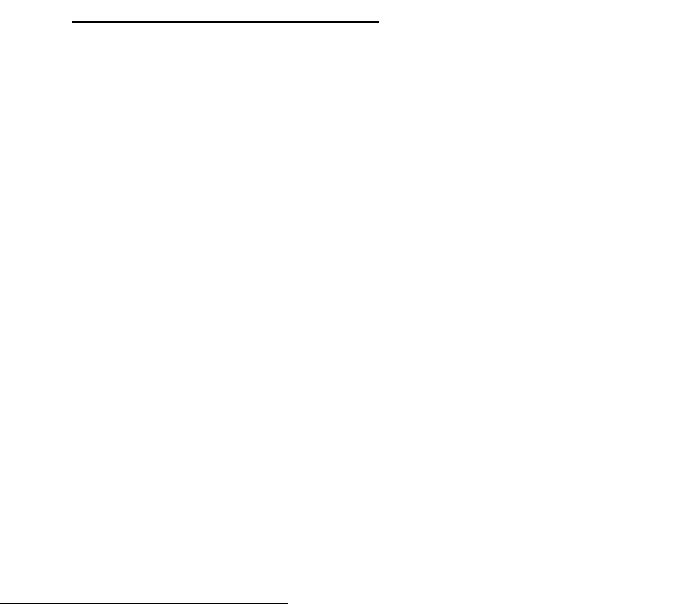
69
RISKY BUSINESS:THE LEGAL IMPLICATIONS OF SOCIAL
MEDIA’S INCREASING ROLE IN EMPLOYMENT DECISIONS
Kathleen McGarvey Hidy, J.D. *
Mary Sheila E. McDonald, J.D. **
I. INTRODUCTION
In Greek mythology, the second of the twelve labors of Hercules was to
slay the Hydra, a giant snake who lived in a swamp and a creature fabled to have as
many as one hundred heads (or as few as five, depending on the version of the
myth).
1
His task was truly herculean because, as the myth instructs, for each Hydra
head Hercules cut off, two more grew in its place. And so it is with the legal risks of
social media use in the workplace. For each legal issue raised and resolved, two
more pop up. It is the many-headed legal Hydra of our times.
The increasing use of social media as a determinative factor in employment
decisions has resulted in litigation and, in certain instances, legislative enactments.
Courts and legislatures alike are wrestling with the rights and responsibilities arising
under federal and state law when social media is involved in employment-related
disputes. The legal landscape is dotted with a wide array of issues ranging from the
evidentiary admissibility of social media postings; the use of social media histories,
both public and password-protected, to screen prospective candidates; the
termination of employees for Twitter and Facebook posts; the unauthorized access
by employers to private social media accounts; ownership disputes between
employers and employees over social media accounts; and the protections
surrounding social media postings under various federal laws. This article explores
this legal landscape, providing a broad overview of the emerging trends in the law
and identifying the legal challenges faced by employers and employees when
disputes erupt in the workplace over social media use.
II. SOCIAL MEDIA DEFINED
Though ubiquitous in its use today, the first known use of the term “social
media” occurred less than a decade ago, in 2004.
2
Social media has been defined as:
forms of electronic communication (as web sites for social
networking and micro blogging) through which users create online
communities to share information, ideas, personal messages, and
other content (as videos).
3
A November 2011 Pew Research Center report titled, Why Americans Use
Social Media, defined social media users as individuals who “use a social
* J.D., Visiting Professor, Dept. of Accountancy and Business Law, Xavier University
** J.D., Associate Dean, School of Business, La Salle University
1
ENCYCLOPEDIA, Encyclopedia.com, Hydra (Mythology), (last visited July 24, 2012)
2
MERRIAM-WEBSTER, http://www.merriam-webster.com,
3
MERRIAM-WEBSTER, http://www.merriam-webster.com,

70 Journal of Legal Studies in Business [Vol. 18
networking site like MySpace, Facebook or LinkedIn.”
4
The Pew Center report
concluded that 65% of online adults use these social networking sites; 13% of online
adults use Twitter.
5
According to the Pew Research Center, the primary motivation
behind social media use for two-thirds of users is to stay in touch with family and
current friends; half of these users cite connecting with old friends as a major
impetus for their social media use.
6
Other motivations for social media use include
connecting with those who share a hobby or interest and connecting with public
figures, which is more popular among Twitter users.
7
A small percentage of social
media users cite finding potential romantic partners as a motivation.
8
In July 2012,
The New York Times reported on this surge in social media use: “Social media is
flourishing; a billion Facebook and 500 million Twitter users would vouch for that.”
9
The multiple rationales behind individuals’ social media use and the
substantial percentage of online adults frequenting social media networking sites
inevitably led to the emergence of social media use as a workplace issue. The legal
issues accompanying this development are significant; there are risks associated with
resolving a social media dispute arising in the employment context for both the
employer and the employee and the law itself is unsettled and emerging.
III. SOCIAL MEDIA’S RISING RELEVANCE IN EMPLOYMENT
DECISIONS
Data demonstrates that social media use and misuse is increasingly related
to employment decisions. Social media monitoring is a tool in the employer’s tool
belt frequently used to screen job applicants whose online behavior may raise red
flags. Social media misuse by current employees has triggered employee disciplinary
actions, including employee firings. But social media is viewed also as a powerful,
positive and, in some instances, profitable aspect of employment-related decisions.
Recruiters cite social media networking sites as useful and important vehicles to
identify and recruit prospective job candidates for employment openings, and a
prospective or current employee’s social media connectivity and influence may
position the employee above other employees jockeying for a career opening or
advancement. These employment trends confirm social media’s relevance in
4
Aaron Smith, Why Americans Use Social Media; Pew Internet and American Life Project, PEW
RESEARCH CTR. (Nov. 15, 2011) at 2, no. 1, http://pewinternet.org/Reports/2011/Why-Americans-Use-
Social-Media/Main-report.aspx.
5
Id. at 2.
6
Id. at 4.
7
Id. at 5.
8
Id. at 4, 5.
9
David Streitfeld & Evelyn M. Rusli, In Sliding Stocks, Some Hear Echo of 2000, N.Y. TIMES,Aug.
28, 2012, at B.1.

2013] Risky Business 71
employment-related decisions ranging from Facebook firings and recruitment red
flags to the clout of a high Klout score.
1. F
ACEBOOK FIRED
The surge in job firings triggered by employees’ social media use has given
birth to a new term used to describe such terminations: “Facebook Fired”.
10
Facebook firings are no longer considered “outliers” but are “the result of a serious
crackdown by corporate America on tracking their employees’ online activities.”
11
In 2009, an internet security firm, Proofpoint, conducted a study of companies with
1,000 or more employees, tracking the companies’ disciplinary actions for employee
misuse of social media.
12
The Proofpoint study confirms the significance of
employee social media use as a determinative factor in employment decisions. 17%
of the companies studied reported having had issues with the social media use of
employees, with 8% dismissing an employee for social media misconduct on sites
such as LinkedIn or Facebook.
13
15% of these employers disciplined an employee
for violating the company’s social media policies or multimedia sharing policies and
17% of the employers in the study reported disciplining an employee for a violation
of the company’s message board or blog policies.
14
Ruth Mantell of The Wall Street Journal’s MarketWatch notes that while
“some employers monitor social-media use, in many cases Facebook ‘friends’ and
co-workers alert management” about offensive posts of fellow employees.
15
Alerting management triggered the Facebook firing of a Georgia public school
teacher, Ashley Payne, who traveled to Europe on her summer vacation and posted
photographs on her private Facebook account of her holding a glass of wine.
16
An
individual claiming to be a concerned parent anonymously emailed Payne’s
employer, Apalachee High School.
17
10
Allison Way, Are You At Risk for Getting “Facebook Fire”? EXAMINER (Mar. 8, 2011),
http://www.examiner.com/article/are-you-at-risk-for-getting-facebook-fired.
Payne sued the public school district, her
employer, on the grounds that it denied her due process and unlawfully forced her to
resign over the incident. Payne’s lawsuit sought reinstatement and reimbursement
for her legal fees. The Georgia Superior Court of the Piedmont Circuit dismissed her
11
Adam Ostrow, Facebook Fired: 8% of US Companies Have Sacked Social Media Miscreants,
M
ASHABLE (Aug. 10, 2009), http://mashable.com/2009/08/10/social-media-misuse.
12
Id.
13
Id.; Jennifer Van Grove, CPK Server Fired for Tweets: Did He Deserve It? MASHABLE (Sept. 15,
2009), http://mashable.com/2009/09/15/cpk-server-fired.
14
Adam Ostrow, Facebook Fired: 8% of US Companies Have Sacked Social Media Miscreants,
M
ASHABLE (Aug. 10, 2009), http://mashable.com/2009/08/10/social-media-misuse.
15
Ruth Mantell, Your Social-Media Posts Could Get You in Hot Water,MARKETWATCH (Jun. 6, 2012),
http://articles.marketwatch.com/2012-06-04/finance/31951218_1_facebook-page-social-media-policies-
workers.
16
Jeanette Borzo, Employers Tread a Minefield,WALL ST. J., Jan. 21, 2011.
17
Dan Fastenberg, Facebook Post Fallout Puts Georgia Teacher Out of A Job,AMERICA ONLINE (Oct.
14, 2011), http://jobs.aol.com/articles/2011/10/14/georgia-teacher-fired-for-posting-drinking-photos.

72 Journal of Legal Studies in Business [Vol. 18
lawsuit in October 2011, ruling that Payne’s resignation should not be classified as
an involuntary termination.
18
California Pizza Kitchen fired its employee and Twitter user, Timothy
DeLaGehetto, aka “@Traphik” who tweeted, “@calpizzakitchen black button ups
are the lamest [expletive] ever!!!” The tweet referred to his employer’s recent
uniform change. The California Pizza Kitchen server’s tweet prompted the company
to trace the Twitter account to a Long Beach store. California Pizza Kitchen
terminated Timothy for his tweet. Undeterred by his firing, Timothy took to the
social media airwaves and posted a video on YouTube about his firing.
19
A social media account mix-up cost an employee his job when he
inadvertently tweeted on Chrysler’s Twitter account, instead of his personal Twitter
account.
20
The employee worked for New Media Strategies, a social media agency
hired by Chrysler to assist in social media outreach. The employee’s tweet on
Chrysler’s Twitter feed said: “I find it ironic that Detroit is known as the [hash]
motor city and yet no one here knows how to [expletive] drive.” New Media
Strategies fired the employee responsible for the tweet mix-up and Chrysler fired
New Media Strategies.
21
High-level executives are not immune from employment discipline and
even termination for social media misuse. The chief financial officer of Francesca’s
Holdings Corporation, a publicly traded company, was terminated for cause after the
company’s Board of Directors conducted an investigation, using the assistance of
outside counsel. The investigation revealed that the chief financial officer, Gene
Morphis, improperly divulged company information through social media in May
2012.
22
Increasingly, firms are creating social media policies to address both what is
posted on social media (the content of the tweets, for instance) and when it is posted
(the productivity slide when employees are posting and tweeting during work.)
23
18
Id.
These policies cover a range of issues arising from social media use in the workplace
involving the following: privacy, intellectual property, protection of confidential,
19
Jennifer Van Grove, CPK Server Fired for Tweets: Did He Deserve It?, MASHABLE (Sept. 15, 2009),
http://mashable.com/2009/09/15/cpk-server-fired.
20
Worker FIRED for F-Bomb Tweet on Chrysler Twitter Account,HUFFINGTON POST (Aug. 10, 2012),
http://www.huffingtonpost.com/2011/03/10/chrysler-twitter-f-bomb-tweet_n_834246.html.
21
Id.
22
Rachel Emma Silverman, Facebook and Twitter Postings Cost CFO His Job,
http://online.wsj.com/article/SB10001424052702303505504577404542168061590.html#printMode.
23
Ruth Mantell, Your Social-Media Posts Could Get You in Hot Water,MARKETWATCH (Jun. 6, 2012),
http://articles.marketwatch.com/2012-06-04/finance/31951218_1_facebook-page-social-media-policies-
workers.

2013] Risky Business 73
non-public information, and contact with media or governmental agencies.
24
Despite
the corporate trend towards instituting social media policies, many companies do not
police social media sites, citing time, expense, and the intrusive aspect of such
tactics.
25
Instead, employer investigations are launched when problems are flagged.
2. R
ECRUITMENT AND RED FLAGS
Social media sites are the train tracks on which the locomotive of job
recruitment runs in the 21
st
Century. The 2012 Bullhorn Reach Rankings Report:
An Inside Look at Social Recruiting in the U.S.A., tracks the use of social media sites
by recruiters looking for potential candidates. In the United States, 77% of job
openings posted by recruiters are posted on LinkedIn, 54% are posted on Twitter,
and 25% are posted on Facebook. 55% of job openings can be found on two or more
social media sites.
26
While both employers and employees use social media to connect skills and
talents with career opportunities, these same sites are exploited and mined for
information about prospective job candidates to determine whether a candidate’s
social media history should disqualify him or her from being considered for a
position.
A survey conducted in 2009 by CareerBuilder.com found the use of social
media sites by employers to screen job candidates had doubled from the previous
year.
27
The Society for Human Resource Management conducted a survey of more
than 500 of its members in October 2011 and concluded that 18% of employers who
recruited job candidates used social network searches as a screening tool for these
candidates.
28
This represented a 5% increase in social media screening by employers
from a 2008 survey conducted on the same topic.
29
Employers routinely seek profiles of prospective candidates gleaned from
social media histories (both public and password-protected) and from public records;
half of recruiters surveyed recently by ExecuNet reported that they eliminated
candidates based on information gathered from internet search engines.
30
24
Tim Devaney, Tweeting Workers ‘Friended” by NLRB; Memo Warns of Restricting Rights, WASH.
T
IMES, June 26, 2012.
The
25
Ruth Mantell, Your Social-Media Posts Could Get You in Hot Water,MARKETWATCH (Jun. 6, 2012),
http://articles.marketwatch.com/2012-06-04/finance/31951218_1_facebook-page-social-media-policies-
workers.
26
Robert Dominguez, Social Climbers Recruiters Using Online Networks to Find Job Candidate, N.Y.
D
AILY NEWS, June 6, 2012, at 37.
27
Meredith Somers, Employers Differ On Checking Online; ACLU Rips Use by State Police, WASH.
T
IMES, Apr. 4, 2012, at A.16.
28
Lini S. Kadaba, What is Privacy? As Job-Seekers Are Judged By Their Tweets and Facebook Posts,
Uncertainty Abounds, P
HILA.INQUIRER, May 2, 2012.
29
Id.
30
Id.

74 Journal of Legal Studies in Business [Vol. 18
offending information ranged from criminal convictions to unethical work practices
to blog posts showing “poor judgment”.
31
For example, Cisco Systems rescinded an
offer to hire Connor Riley based on her tweet: “Cisco just offered me a job! Now I
have to weigh the utility of a fatty paycheck against the daily commute to San Jose
and hating the work.”
32
Government data confirms these trends. The Equal Employment
Opportunity Commission (“EEOC”) notes that 75% of recruiters are required by
companies they contract with to perform online searches of prospective candidates,
and 70% of recruiters in the United States reported rejecting a candidate based on
such pre-employment screening.
33
Candidates consent to the screenings and are
informed of any adverse information uncovered.
34
Importantly, these screenings
attempt to sanitize the data gathered of any identifying information relating to a
candidate’s religion, race, marital status, disability, or any other factor that might run
afoul of employment discrimination laws.
35
If social media accounts are maintained
as private accounts and are password protected, the hunt for information does not
intrude on these accounts unless the password is requested.
36
The temptation to conduct social media screenings on pre-employment
investigations is strong, according to Lester Rosen, Chief Executive Officer of a
California-based firm that conducts employment screenings: “From an employer’s
standpoint every hire is critical and there are huge potential risks. Given the
investment, it is very inviting to go on-line and use this brand new shiny toy that
allows you ostensibly to look under the hood and see what job candidates talk about
and what they do outside of an interview.”
37
However, Max Drucker, an executive
at Social Intelligence, a California company which performs online pre-employment
screenings for employers, claims that less than a third of the data retrieved in such
screenings by his firm comes from major social media platforms such as Facebook,
Twitter and MySpace.
38
31
Id.
Still, confusion over privacy settings and terms of service
agreements in social media platforms leave social media users vulnerable in job
32
http://www.msnbc.com.
33
Jennifer Preston, Letter, Resume, Facebook status …; Employers Commission Social Media Checks in
Vetting Job Candidates, I
NT’L HERALD TRIBUNE, July 22, 2011, at 14; Jennifer Preston, Social Media
History Becomes a New Job Hurdle, N.Y. T
IMES, July 21, 2011, at B.1.
34
Id.
35
Id.
36
Lini S. Kadaba, What is Privacy? As Job-Seekers Are Judged By Their Tweets and Facebook Posts,
Uncertainty Abounds, P
HILA.INQUIRER, May 2, 2012.
37
Ron Scherer, Facebook Privacy: Can Firms Legally Demand Password From Job Applicants?; On
Friday Facebook Criticized the New Practice of Screening Job Applicants as ‘Alarming,’ and Some
Employment Specialists Say It Could Expose Firms to Legal Landmines,C
HRISTIAN SCI.MONITOR,
Mar. 23, 2012.
38
Jennifer Preston, Letter, Resume, Facebook status …; Employers Commission Social Media Checks in
Vetting Job Candidates, I
NT’L HERALD TRIBUNE, July 22, 2011, at 14.

2013] Risky Business 75
searches because users may be unaware that data has become publicly-available and
the target of pre-employment information fishing expeditions.
39
3.
T
HE CLOUT OF A KLOUT SCORE
The news is not all negative for active social media users who are seeking
employment. Social media-savvy employers now view an employee’s social media
connectivity and influence as a potential value-added for the employer. Klout is a
service that collects and scores an individual’s social media connections, focusing
not on the quantity of connections but rather on the quality or influence of the social
media user. The number of re-tweets or repeated social media posts drives up the
score. Increasingly, employers are interested in the Klout score of an employee or
prospective employee because an influential social media employee can tout the
employer’s brand through LinkedIn, Twitter, YouTube, Pinterest, etc. This is a
potential profit engine for the employer.
40
A prospective employee’s high Klout
score can signal to an employer that the job candidate is influential, plugged-in, and
capable of using personal social media accounts to promote the employer’s brand. A
low Klout score may cost a job candidate the job. For example, Sam Fiorella, a
candidate for a vice-presidency position at a large marketing firm in Toronto, had his
interview terminated when the interviewer discovered his low Klout score. Fiorella
was told he was terminated from the list of prospective candidates due to the low
score.
41
IV. THE SOCIAL MEDIA LITIGATION TRAP
The rising relevance of social media use in employment-related decisions
has led to litigation over the rights and responsibilities of employers and employees
arising under both federal and state law. The litigation brought by employers and
employees has been multi-faceted; the legal claims are crafted under federal statutory
law, state common law and, in rare instances, constitutional jurisprudence. The
contexts in which these legal claims are pursued are unique and varied. Employers
have charged employees with violations of intellectual property rights over LinkedIn
accounts and employees have sued employers for privacy violations for MySpace
eavesdropping. Courts grapple with the terminology and the technology surrounding
social media use, and they wrestle with the application of social media workplace
disputes to laws pre-dating social media’s invention and arrival into the employment
sphere.
39
Id.
40
Fiona Smith, All You Need to Score is a Little Bit of Klout,AUSTL.FIN.REV. (May 22, 2012),
http://afr.com/p/national/work_space/how_much_klout_do_you_have_online_jDbKtToN0wIslTX8sNx2B
P.
41
Id.

76 Journal of Legal Studies in Business [Vol. 18
The litigation arising from social media use in the workplace encompasses a
staggering array of legal issues. These include: (1) the discoverability and
evidentiary admissibility of social media postings; (2) claims brought under federal
and state discrimination laws; (3) violations of the federal labor laws; (4) federal
statutory and constitutional claims as diverse as the Stored Communications Act, the
Health Insurance Portability and Accountability Act, the Fair Credit Reporting Act,
the First Amendment; and (5) intellectual property issues.
1. S
OCIAL MEDIA POSTINGS’EVIDENTIARY ROLE
Before addressing the substantive legal claims surrounding social media
disputes in the employment context, it should be noted that, procedurally, the
courthouse doors are wide open to the use of social media postings for discovery and
evidentiary purposes. Courts have deemed social media postings discoverable for
evidentiary purposes in both civil and criminal cases.
42
In 2012, a state court judge
in Pennsylvania granted a plaintiff access to a defendant’s Facebook page, ordering
the defendant to refrain from altering the page for a period of time to allow the
plaintiff an opportunity to review the Facebook page.
43
In April 2012, a New York
state court judge ruled in a criminal action that a Twitter account could be
subpoenaed.
44
In 2011, a Virginia state court judge issued sanctions against a lawyer
representing a plaintiff in a personal injury case. The attorney was sanctioned for
filing a baseless motion seeking to halt the defendant from introducing into evidence
information about the plaintiff’s alleged injuries. The information was gleaned from
social media sites used by the plaintiff and her family, including MySpace,
Facebook, and Google.
45
The Virginia court noted that the information obtained on
the social media sites was posted on a public medium and available to anyone. The
social media users had not designated the information as “non-public” and by failing
to secure it as such, the information was readily accessible and usable by the
defendant in his critique of plaintiff’s claims. The court stated: “Social media and
internet searches are regularly becoming a normal step in an attorney’s matter [stet]
of public information.”
46
42
Eric Meyer, Court Allows Plaintiff Quick Peek Into Defendant’s Facebook Account, LITIGATION
RESOURCE CTR. (Feb. 26, 2012),
http://www.lexisnexis.com/community/litigationresourcecenter/blogs/litigationblog/archive/2012/04/26/co
urt-allows-plaintiff-quick-peek-into-defendant-s-facebook-account.aspx; People v. Harris, Case No. 2011
NY 080152 (N.Y. Crim. Ct.) Apr. 20, 2012.
43
Eric Meyer, Court Allows Plaintiff Quick Peek Into Defendant’s Facebook Account, LITIGATION
RESOURCE CTR.(Feb. 26, 2012),
http://www.lexisnexis.com/community/litigationresourcecenter/blogs/litigationblog/archive/2012/04/26/co
urt-allows-plaintiff-quick-peek-into-defendant-s-facebook-account.aspx.
44
People v. Harris, Case No. 2011 NY 080152 (N.Y. Crim. Ct.) Apr. 20, 2012.
45
Womack v. Yeoman, 2011 Va. Cir. LEXIS 143 (Va. Cir. Oct. 28, 2011).
46
Id.

2013] Risky Business 77
The logical implication of these evidentiary rulings is that an employer or
an employee in a workplace dispute unrelated to social media use could use evidence
found on social media sites. For example, an employee’s social media accounts
might be reviewed for evidence of employee misconduct, such as theft or misuse of
company property. This magnifies the potential impact social media has on any
employment-related dispute.
2. C
HARGES OF DISCRIMINATION
Employers risk running afoul of employment discrimination laws by
monitoring and screening of social media use. Current or prospective candidates
may attack employers’ pre-employment online screenings, including the screening of
social media, as evidence of employment discrimination in violation of state and
federal discrimination laws, including Title VII of the Civil Rights Act, the
Americans with Disabilities Act, and the Age Discrimination in Employment Act.
The legal risks run the gamut from a job candidate accusing an employer of religious
discrimination after learning of her religious affiliation on Twitter, to a current
employee filing a charge of sexual harassment after a supervisor repeatedly tries to
“friend” him on Facebook.
47
The EEOC reviewed numerous workplace discrimination claims in 2011
involving employers’ use of social media screening of prospective employees as a
hiring tool.
48
The legal risks of such online screening, which includes internet and
social media searches, can be significant. For example, human resources consultant
Jessica Miller-Merrell warns that the EEOC’s use of the “unconscious bias” theory
in discrimination lawsuits can easily be applied to social media cases where
information about a disability, sexual preference, or pregnancy is uncovered by a
recruiter or an employer through a social media search.
49
For example, the
University of Kentucky is now a defendant in a lawsuit brought by an astronomy
professor charging that he was discriminated against, based on his religious beliefs,
when he was denied a promotion to department chair. The professor alleges that the
University search committee’s bias towards him arose when the committee found a
link to an article on the professor’s personal website that disclosed the professor’s
belief in creationism.
50
Additionally, a Library of Congress employee has alleged that he was
harassed and subsequently fired after his employer discovered his homosexuality
47
Jeanette Borzo, Employers Tread a Minefield,WALL ST. J., Jan. 21, 2011.
48
Sylvia Hsieh, 2011 Employment Law News Wrap-Up, LAWS.WKLY. USA. (2011).
49
Social Media Research May Expose Discrimination Claims, COMMWEB (Apr. 20,
2011),http://www.lexisnexis.com.precise.petronas.com.my/community/litigationresour
cecenter/blogs/litigationblog/archive/2012/04/26/court-allows-plaintiff-quick-peek-into-defendant-s-
facebook-account.aspx.
50
Id.

78 Journal of Legal Studies in Business [Vol. 18
when the employee “liked” a Facebook page supporting gays and lesbians. The
EEOC filed a discrimination claim against the Library of Congress on behalf of the
dismissed employee.
51
Ruth Mantell of The Wall Street Journal’s Market Watch
notes, “These recent cases highlight an emerging reality about potential
repercussions at work after engaging in social media: With Facebook users
generating billions of ‘likes’ and comments every day, there is plenty of potential for
workplace problems.”
52
3. THE FEDERAL LABOR LAWS
Workplace disputes involving social media use brought before the National
Labor Relations Board (NLRB), the federal agency charged with administering the
federal labor laws, have skyrocketed in the past several years. The NLRB has been
deluged with complaints from workers who allege that employers unlawfully
terminated them after reviewing Facebook posts, tweets, and YouTube videos.
53
It
has issued multiple reports, memoranda, and, in certain cases, rulings in an effort to
address the potential legal risks associated with disciplining or terminating
employees for social media use.
In 2011, the NLRB issued a report clarifying the legal protections
surrounding social media use under the federal labor laws as well as the legal risks
associated with terminating employees for social media use.
54
Both union and
nonunion employees enjoy federal law protection for discussions with each other
involving their work conditions as well as efforts to lobby together to alter or
improve those conditions. The NLRB made clear that such workplace discussions do
not lose these legal protections simply because they occur on a social media site such
as Twitter or Facebook. If Facebook or Twitter posts are made by an employee
“with or on the authority of other employees, and not solely by and on behalf of the
employee himself,” the social media use constitutes concerted activity protected
under the federal labor laws.
55
Employer violations of federal labor laws cited by the NLRB include the
unlawful firing of a luxury-car dealership salesman who posted on Facebook his
disappointment over the quality of the food served at the dealership’s sales event.
The NLRB determined that the salesman’s posts criticizing his employer related to
workplace conditions and arose out of discussions among his co-workers who shared
51
Ruth Mantell, Your Social-Media Posts Could Get You in Hot Water,MARKETWATCH (Jun. 6, 2012),
http://articles.marketwatch.com/2012-06-04/finance/31951218_1_facebook-page-social-media-policies-
workers.
52
Id.
53
Catherine Ho, Businesses Abuzz About Workplace Rules on Social Media, WASH.POST, Oct. 3, 2011,
at A.15.
54
Sarah Jane Shanaha, Slow Trigger When Firing Over Twitter, CFO Sept. 29, 2011,
http://www3.cfo.com/article/2011/9/regulation_fired-over-twitter-facebook-nlrb-social-media.
55
Id.

2013] Risky Business 79
his concerns.
56
If an employee is using social media post to vent individual
complaints, however, and not using social media in a joint effort to communicate
with other employees, termination of that employee would likely not constitute a
federal labor law violation, according to the NLRB.
57
This may be true even if the
employee’s complaints relate to his or her supervisor.
A September 2011 case best characterized as “damned if you, damned if
you don’t” involved a non-profit employer who fired employees for cyber-bullying a
co-worker through Facebook. An NLRB administrative law judge ruled that the
employer, a social services non-profit in New York, violated the National Labor
Relations Act when it fired five workers because their Facebook posts constituted
protected discussions of their working conditions.
58
The episode began when one
employee posted on her Facebook page comments attributed to a co-worker in which
the co-worker complained about her fellow employees not doing enough to assist the
non-profit’s clients. The posting employee solicited feedback, via Facebook, from
other employees about these comments. Feedback indeed followed and included
profanity as well as posts about workplace conditions and staffing problems. The
co-worker accused of making the comments critical of her fellow employees saw the
posts and alleged that she was the victim of harassment and cyber-bullying. The
social services non-profit fired the employees who engaged in the Facebook
postings.
59
The NLRB administrative law judge ruled that the non-profit’s termination
of these employees violated Section 7 of the National Labor Relations Act, which
provides protections for workers who communicate with one another to improve
working conditions and wages. Specifically, the judge found that the Facebook posts
related to terms and conditions of employment, job performance, and staffing levels.
These social media discussions were deemed workplace discussions protected under
federal law. The remedy ordered was reinstatement and an award of back-pay for
the five fired workers.
60
In another recent case, the NLRB ruled that an employee’s clicking of the
“Like” button on a co-worker’s Facebook post about their employer’s error in the
withholding of taxes constituted a protected discussion under the National Labor
Relations Act. The employer’s discharge of the employee who clicked Facebook’s
56
Id.
57
Id.
58
Catherine Ho, Businesses Abuzz About Workplace Rules on Social Media, WASH.POST, Oct. 3, 2011,
at A.15; Michelle Singletary, Can Complaining About Your Job on Facebook Get You Fired, W
ASH.
P
OST, Sept. 15, 2011, at A.14.
59
Michelle Singletary, Can Complaining About Your Job on Facebook Get You Fired, WASH.POST,
Sept. 15, 2011, at A.14.
60
Catherine Ho, Businesses Abuzz About Workplace Ru.es on Social Media, WASH. POST, Oct. 3, 2011,
at A.15; Michelle Singletary, Can Complaining About Your Job on Facebook Get You Fired, W
ASH.
P
OST, Sept. 15, 2011, at A.14.

80 Journal of Legal Studies in Business [Vol. 18
“Like” button was deemed unlawful and in violation of the federal labor laws.
61
Similarly, the NLRB determined that an administrative assistant’s Facebook post
was a communication protected under the federal labor laws because the
administrative assistant was fired for complaining on Facebook that she was
reprimanded by her employer for becoming involved in co-workers’ work-related
problems.
62
Conversely, the NLRB ruled that a pediatric hospital respiratory
therapist’s Facebook posts in which she complained that a co-worker was “driving
her nuts” and that she planned to “beat him with a ventilator” were not protected
communications because the respiratory therapist’s rants did not include
recommending that her employer take action against her “annoying” co-worker.
63
In May 2012, the NLRB issued its third memorandum on the topic of social
media use and the federal labor laws, paying particular attention to social media
policies adopted by employers to regulate employee social media use. The NLRB
criticized six of seven corporate social media policies it reviewed for being either too
vague for proper enforcement, or too intrusive of employees’ right to free expression
on online sites.
64
At issue in these social media policies was the right of employees
to use social media to discuss the “terms and conditions” of their employment,
without fear of retaliation or retribution.
65
NLRB General Counsel, Lafe Solomon, cautioned that social media policies
cannot “interfere with, restrain, or coerce employees in the exercise of” their right
under the National Labor Relations Act to engage in “self-organization, to form, join,
or assist labor organizations.”
66
He noted that a corporate social media policy that
warns employees to “think carefully about ‘friending’ co-workers” might unlawfully
“discourage communications among co-workers and thus necessarily interfere with
activity” involving unions.
67
Solomon also warned that a social media policy
prohibiting employees from revealing “non-public information on any public site”
runs afoul of federal labor laws because it “would be reasonably interpreted to apply
to discussions about, or criticism of, the employer’s labor policies and its treatment
of employees.”
68
61
Nick Birkenhauer, Employees’ Social Media Activity: NLRB Clicks the “Like” Button;JDSUPRA,
(Apr. 24, 2012), http://www.lexisnexis.com/hottopics/lnacademic.
Finally, a social media policy which encourages employees to
“report any unusual or inappropriate internal social media activity” might be viewed
62
Ruth Mantell, Your Social-Media Posts Could Get You in Hot Water,MARKETWATCH (Jun. 6, 2012),
http://articles.marketwatch.com/2012-06-04/finance/31951218_1_facebook-page-social-media-policies-
workers.
63
Id.
64
Tim Devaney, Tweeting Workers ‘Friended” by NLRB; Memo Warns of Restricting Rights, WASH.
T
IMES, June 26, 2012; Michelle Davis, National Labor Relations Board Releases Third Report On Social
Media Policies, L
AWS.WKLY.USA.(2012).
65
Tim Devaney, Tweeting Workers ‘Friended” by NLRB; Memo Warns of Restricting Rights, WASH.
T
IMES, June 26, 2012.
66
Id.
67
Id.
68
Id.

2013] Risky Business 81
as “encouraging employees to report to management the union activities of other
employees,” an unlawful labor practice.
69
Solomon commended social media policies that are specific and provide
illustrative examples. He lauded corporate social media policies that encourage
employees to be respectful in their social media use and to refrain from posting
comments that “could be viewed as malicious, obscene, threatening or
intimidating.”
70
Echoing the NLRB’s directives on corporate social media policies
and the federal labor laws, the United States Chamber of Commerce issued a
comprehensive report in August 2011 on the impact labor laws have on employers’
implementation of social media policies in the workplace.
71
4. OTHER FEDERAL LAWS IMPLICATED
Cases involving employment-related disputes involving social media use
have implicated federal statutes as disparate as the Fair Credit Reporting Act, the
Health Insurance Portability and Accountability Act, and the Stored
Communications Act. Claims involving the United States Constitution have also
been litigated.
In June 2012, the Federal Trade Commission settled its first civil case
brought against a company for violations of the Fair Credit Reporting Act in
connection with the company’s data gathering and sale of information gathered on
the Internet and social media sites for use in screening of job candidates.
72
The FTC
assessed $800,000 in civil fines against a California firm, Spokeo, for failure to
ensure that its consumer profiles were accurate and used for lawful purposes. These
profiles were marketed to employment recruiters and human resource departments as
well as companies involved in employment screening. The profiles included
information such as an individual’s email address, social media use, photographs,
marital status, ethnicity, and religion. The Federal Trade Commission unanimously
voted to refer the complaint against Spokeo to the United States Justice Department
for further review.
73
In December 2009, the Health Insurance Portability and Accountability Act
(HIPAA) was drawn into the mix. Jennifer Carter, an administrative assistant at the
nursing school at the University Medical Center (UMC), was disciplined and then
encouraged to resign her position for her reply Twitter tweet to Mississippi Governor
69
Id.
70
Id.
71
Catherine Ho, Businesses Abuzz About Workplace Rules on Social Media, WASH.POST, Oct. 3, 2011,
at A.15.
72
Edward Wyatt, U.S. Fines Data Collector for Illegal Profiling, INT’L HERALD TRIBUNE, June 13,
2012; Edward Wyatt, U.S. Penalizes Online Company in Sale of Personal Data, N.Y. T
IMES, June 13,
2012.
73
Id.

82 Journal of Legal Studies in Business [Vol. 18
Haley Barbour. Carter replied to Barbour’s tweet about trimming the state of
Mississippi’s expenses in light of its “dire fiscal situation” with a tweet of her own:
“Schedule regular medical exams like everyone else instead of paying UMC
employees overtime to do it when clinics are usually closed.”
74
Carter claimed her
tweet referred to Governor Barbour’s health checkup at UMC’s clinic, which was
performed on a Saturday when the clinic is normally closed and required special
staffing.
75
Two days after Carter’s tweet, UMC advised Carter that her tweet
violated HIPAA and, according to Carter, she was “strongly encouraged to resign.”
76
In 2009, a federal jury in New Jersey returned a guilty verdict against an
employer for violations of the federal and New Jersey Stored Communication Acts
in a case brought by two employees terminated for social media use.
77
The jury
awarded the two former employees, Brian Pietrylo and Doreen Marino,
compensatory and punitive damages against their employer, Hillstone Restaurant
Group d/b/a Houston’s for the employer’s misconduct in viewing a password-
protected, private chat group site on MySpace.com created by the employees to
“vent about any BS we deal with at work.”
78
The MySpace posts included sexual
remarks about managers and customers at Houston’s, jokes about the restaurant
chain’s policies, references to violence and illegal drug use, and a copy of an
employee test given to restaurant workers. The jury found that the restaurant chain
had coerced another employee into providing a manager the password to the social
media site and that the restaurant had acted maliciously in repeatedly accessing the
site using the coerced employee’s password.
First Amendment concerns have also been raised in employment-related
social media disputes. A federal district court judge in the Eastern District of
Virginia recently dismissed a case brought by six employees of the Sheriff’s
Department in Hampton, Virginia. One of the six employees had clicked the “Like”
button on the Facebook page of the Sheriff’s opponent in a political race. The
federal court refused the terminated employees’ request to rule that a public sector
employee’s “liking” a Facebook page rose to the level of constitutionally protected
free speech under the First Amendment.
79
5. OWNERSHIP DISPUTES OVER SOCIAL MEDIA ACCOUNTS
74
Julia Straw, Woman Out of a Job After Sending Tweet to Governor Barbour, WLBT (Dec. 22, 2009),
http://www.wlbt.com/story/11713360/woman-out-of-a-job-after-sending-tweet-to-governor-barbour.
75
Id.
76
Id.
77
Pietrylo v. Marino, 2009 U.S. Dist. LEXIS 88702 (D. N.J. Sept. 25, 2009); Pietrylo v. Marino, 2008
U.S. Dist. LEXIS 108834 (D.N.J. July 25, 2008).
78
Id.
79
Ruth Mantell, Your Social-Media Posts Could Get You in Hot Water,MARKETWATCH (Jun. 6, 2012),
http://articles.marketwatch.com/2012-06-04/finance/31951218_1_facebook-page-social-media-policies-
workers.

2013] Risky Business 83
Legal disputes between an employer and employee over ownership rights in
social media accounts or profiles are also on the rise, fueling litigation over who
owns a social media account when the employment relationship ends.
80
Courts are
faced with adjudicating these high-stakes disputes where profits are clearly linked to
a social media user’s influence and clout in the marketplace but where the
delineation between who owns and controls a social media account may not be so
clearly marked.
In a highly contentious case still working its way through the federal district
court in Illinois, the court issued an opinion attempting to sort through the numerous
legal issues surrounding a company’s use of a hospitalized employee’s personal
Twitter and Facebook accounts to promote the company’s business.
81
Jill Maremont
was employed as the Director of Marketing, Public Relations, and E-Commerce for a
Chicago-based interior design firm, SFDG. Maremont used her personal Twitter and
Facebook accounts to promote SFDG and she created and blogged on an SFDG blog.
While she was hospitalized after an auto accident, Maremont alleges that SFDG
posted tweets on her personal Twitter account and posted entries on her Facebook
page promoting SFDG. A guest blogger took over the SFDG blog during her
hospitalization. Maremont requested that SFDG refrain from using her social media
accounts, but her employer ignored these requests. Maremont returned to work at
SFDG but eventually resigned. She subsequently sued her former employer, alleging
that SFDG’s conduct violated the Lanham Act, Stored Communications Act, Illinois’
Right of Publicity Act, and the state’s common law right to privacy. Adjudicating
cross-motions for summary judgment, the federal district court made multiple rulings
relating to the alleged usurpation of Maremont’s social media accounts by her
employer.
First, the court concluded that Maremont created her personal Twitter and
Facebook accounts for her own economic benefit even though she did promote her
employer’s interests on these sites as part of her marketing strategy as Director of
Marketing for SFDG. Therefore, the court ruled that Maremont had standing to
bring a false endorsement claim under the Lanham Act for SFDG’s unauthorized use
of Maremont’s Twitter and Facebook accounts.
Second, Maremont’s claim that her employer’s use of her personal social
media accounts violated the federal Stored Communications Act survived summary
judgment since there were “disputed issues of material fact [as to] whether
Defendants exceeded their authority in obtaining access to Maremont’s personal
Twitter and Facebook accounts.”
82
80
Communication Control,EMP’RS’LAW, (July 7, 2012),
http://www.lexisnexis.com/hottopics/lnacademic.
The federal Stored Communications Act
81
Maremont v. Susan Fredman Design Group, LTD, 2011 U.S. Dist. LEXIS 140446 (N.D. Ill. Dec. 7,
2011).
82
Id.

84 Journal of Legal Studies in Business [Vol. 18
authorizes lawsuits for “unauthorized, intentional access to communications that are
held in electronic storage” and covers Facebook, Twitter and other social media
sites.
83
Third, the federal district court ruled that Maremont’s employer did not
violate Illinois’ Right to Publicity Act because SFDG did not pass itself off as
Maremont in the tweets sent from Maremont’s private Twitter account.
Interestingly, the federal district court dismissed Maremont’s common law right to
privacy intrusion upon seclusion claim, noting that Maremont must have
demonstrated that the matter at issue in the lawsuit was private and that she
attempted to keep private facts private in order to bring a valid claim. The district
court concluded that Maremont’s Facebook and Twitter posts were not private, as
required under the common law tort: Maremont boasted that she had 1,250 Twitter
followers and often linked her Facebook and Twitter posts to SFDG’s public blog.
Also, Maremont did not attempt to keep posts made on any of these accounts private.
A case currently pending in federal district court in California involves a
dispute over the legal rights to a Twitter account used by a former employee.
84
Noah
Kravitz was an editor and video blogger for PhoneDog, a South Carolina-based
company, which offers reviews, information, and news in phone and related
technologies industries.
85
PhoneDog uses social media to market and promote its
services, including YouTube, Twitter, and Facebook. In the lawsuit, PhoneDog
alleges that it provided Kravitz with a Twitter account that Kravitz used to promote
PhoneDog’s services and to disseminate information. PhoneDog maintains that the
Twitter account and password are confidential proprietary information owned by
PhoneDog.
In 2010, when Kravitz left his employment at PhoneDog, the Twitter
account had 17,000 followers. Refusing to relinquish the account to PhoneDog,
Kravitz changed the Twitter account’s handle and continued to use the account.
86
PhoneDog sued Kravitz alleging misappropriation of trade secrets, intentional
interference with prospective economic advantage, negligent interference with
prospective economic advantage, and conversion.
87
83
Id.
PhoneDog contends that
Kravitz’s Twitter followers are akin to a company’s customer list and are the
property of PhoneDog. PhoneDog is seeking an order requiring Kravitz to pay it
84
Phonedog v. Kravitz, 2012 U.S. Dist. LEXIS 10561 (N.D. Cal. Jan. 30, 2012) [hereinafter Phonedog];
Phonedog v. Kravitz, 2011 U.S. Dist. LEXIS 129229 (N.D. Cal. Nov. 8, 2011) [hereinafter Kravitz].
85
Ron Barnett, Ex-Employee Is Sued Over Keeping Work Twitter Account,USATODAY, Feb. 24, 2012,
at A.4.
86
Phonedog, supra note 84.
Kravitz, supra note 84.
87
Id.

2013] Risky Business 85
$2.50 per follower per month for eight months, an amount totaling $340,000.
88
Kravitz responded to the lawsuit, arguing that Twitter legally owns the Twitter
account and that nearly half of the tweets he made on the Twitter account were
personal.
89
To date, PhoneDog’s lawsuit has survived two motions to dismiss
brought by Kravitz.
In December 2011, a federal district court in Pennsylvania ruled on the
lawfulness of an employer’s actions involving the LinkedIn account of a high-level
employee who was being terminated.
90
The litigation arose after Dr. Linda Eagle
and her partners sold the stock of a financial services and training company they
founded, Edcomm, to Sawabeh Information Services Company (SISCOM).
Edcomm continued to employ Dr. Eagle and her partners for several months after the
stock sale. Eventually, Dr. Eagle and her partners were involuntarily terminated.
Litigation ensued in two separate cases brought in federal court in New York and in
Pennsylvania.
In the Pennsylvania case, Dr. Eagle alleged that her employer, Edcomm,
gained unauthorized access to Dr. Eagle’s LinkedIn account when she was
terminated. She asserts that her employer’s actions were unlawful and in violation of
federal and state law, including the Computer Fraud and Abuse Act, the Lanham
Act, invasion of privacy, and misappropriation of identity. Edcomm countersued
Dr. Eagle, accusing her of unfair competition and misappropriation of Edcomm’s
connections and telephone number on that LinkedIn account.
Facing a pitched battle between employer and employee, the federal district
court in Pennsylvania refused to dismiss Edcomm’s misappropriation and unfair
competition counterclaims against Dr. Eagle. In a nuanced ruling, the court
concluded that the LinkedIn account was not a protectable “trade secret” because
“neither the telephone number nor the LinkedIn account connections qualify as trade
secrets, as both are either generally known in the wider business community or
capable of being easily derived from public information,” but if the LinkedIn account
connections and content were developed by Edcomm and not Dr. Eagle, then
Edcomm had stated a cognizable claim of misappropriation of an idea.
91
88
Ron Barnett, Ex-Employee Is Sued Over Keeping Work Twitter Account,USATODAY, Feb. 24, 2012,
at A.4.
The federal
district court further ruled that this alleged misappropriation of the LinkedIn account
89
Id.
90
Eagle v. Morgan, 2011 U.S.Dist. LEXIS 147247 (E.D. Pa. Dec. 22, 2011).
91
Id.; In September, 2010, a federal district court made a similar finding in a lawsuit brought by an
executive search firm against a former executive for misappropriation of trade secrets. The court ruled that
the purportedly confidential and proprietary information contained in the firm’s database lost any
protectable interest since the information was accessible through social media sites such as LinkedIn and
internet sites such as Bloomberg or Google. See
Sasqua Group, Inc. v. Courtney, 2010 U.S.Dist. LEXIS
98621 (E.D.N.Y. Sept. 7, 2010); Sasqua Group, Inc. v. Courtney, 2010 U.S.Dist. LEXIS 93422 (E.D.N.Y.
Aug. 2, 2010).

86 Journal of Legal Studies in Business [Vol. 18
information by Dr. Eagle could also constitute a tortious claim of unfair competition
under Pennsylvania law.
92
This legal tug-of-war over rights to social media accounts when
employment ends is not limited to the United States. In a 2008 British case, the High
Court concluded that a former Hays Specialist Recruitment employee had breached
confidential information through the use of the employee’s LinkedIn account. The
High Court ordered the employee to disclose to the employer the business contacts
added to the LinkedIn account.
93
In 2011, the BBC’s chief political correspondent
left the BBC to accept a position with ITV and kept her Twitter account and its
58,000 followers. The BBC declined to challenge the legal ownership of the Twitter
account.
94
V. LEGISLATURES REACT
With the litigation floodgates opened, courts are left to wrestle with the
rights and responsibilities of parties involved in social media employment-related
disputes under existing law. State and federal legislatures are beginning to weigh in
on this legal debate. Employers’ practice of asking or, in some instances, requiring
prospective and current employees to divulge their passwords to their private social
media accounts in order to screen or monitor these individuals is not believed to be
widespread.
95
However, state and federal lawmakers are preemptively addressing
this issue by crafting legislation that legally prohibits employers from requesting or
requiring job candidates or current employees to disclose this information.
Legislatures in several states including Maryland, Illinois, California,
Massachusetts, New Jersey, Washington, Minnesota, and Ohio have introduced laws
that prohibit employers from requesting employees or prospective employees to
divulge their usernames and passwords to social media accounts.
96
Each state’s
statutory prohibitions vary, but all are designed to oppose employers’ attempts to
intrude into private social media accounts.
97
92
The terms of service agreements provided by the social media source may help determine the outcome
of ownership disputes. For example, LinkedIn’s service agreement provides that if an employee’s account
is in his or her own name, the employee retains ownership rights in the account, and an employer may not
require an employee to transfer her account or disclose her password and username to the employer.
While the ownership and right to control a LinkedIn account may reside with the employee, confidential
or proprietary information communicated through that account might legally belong to the employer. See
Communication Control,THE EMP’RS’LAW, (July 5, 2012),
http://www.lexisnexis.com/hottopics/lnacademic.
93
Id.
94
Shane Richmond, Can Your Employer Claim Your Social Media Connections?; An American Blogger
is Being Sued by His Former Employers Over Ownership of His Twitter Account. Could the Same
Happen Here?,T
ELEGRAPH, Dec. 29, 2011.
95
Jessica Guynn, Social Media Bill OKd, L.A. TIMES, May 11, 2012.
96
Id.
97
Id.

2013] Risky Business 87
The legislation passed in Maryland (which became law in October 2012)
prohibits employers from, as a condition of employment, asking or requiring current
or prospective employees to disclose information that would give the employer
access to their private social media accounts.
98
Brad Shear, a Maryland attorney
who worked on the drafting of the legislation, notes that this legal constraint “not
only protects employees’ privacy, [sic] it also protects employers. It protects
[employers] from having to create new legal duties and liabilities and compliance
costs.”
99
In May 2012, California ‘s state Assembly passed Assembly Bill 1844,
which bans employers from asking prospective and current employees for social
media user names and passwords. The legislation would also allow employers to
continue to check publicly available information from social networking sites of
employees or job applicants. Public sector employees in law enforcement or security
agencies are exempted from the prohibitions in this bill.
At the federal level, Congress is considering two proposed pieces of
legislation: the Social Networking Online Protection Act (SNOPA) and the
Password Protection Act of 2012.
100
These proposed statutes either prohibit or
penalize employers who seek access to social networking accounts of current or
prospective employees. Congressman Eliot Engel, who introduced SNOPA in April
of 2012, called such employer tactics “coercive,” and he argued that social media
accounts should enjoy the same privacy protections as banking accounts and email
accounts.
101
Not surprisingly, the social media industry has joined this debate. Facebook
welcomed legislative restrictions on employers requesting passwords to private
social media accounts. Facebook’s Privacy Chief, Erin Egan, stated, “As a user, you
shouldn’t be forced to share your private information and communications just to get
a job. We’ll take action to protect the privacy and security of our users, whether by
engaging policymakers or, where appropriate, by initiating legal action.”
102
98
Catherine Ho, Md. Employers Cannot Collect Facebook Passwords, WASH.POST, Apr. 16, 2012, at
A.14; Maryland Becomes First State To Enact Password Privacy Protection Bill, HR.BLR (May 15,
2012), http://hr.blr.com/HR-news/HR-Administration/Electronic-Monitoring/Maryland-Becomes-First-
State-to-Enact-Password-Pri.
Egan
further noted that it is “a violation of Facebook’s Statement of Rights and
99
Catherine Ho, Md. Employers Cannot Collect Facebook Passwords, WASH.POST, Apr. 16, 2012, at
A.14.
100
Maryland Becomes First State To Enact Password Privacy Protection Bill, HR.BLR (May 15, 2012),
http://hr.blr.com/HR-news/HR-Administration/Electronic-Monitoring/Maryland-Becomes-First-State-to-
Enact-Password-Pri.
101
Laws Proposed in the United States, 2012, Apr. 30, 2012,
http://www.telegraph.co.uk/technology/facebook/9235869/Laws-to-protect-Facebook-passwords-from-
prying-employers.htm.
102
Id.

88 Journal of Legal Studies in Business [Vol. 18
Responsibilities to share or solicit a Facebook password.”
103
In March 2012,
Facebook issued a warning to employers regarding the practice of requesting
password information to Facebook sites and threatened to consider possible legal
action if its policy forbidding password sharing was violated.
104
Facebook stated:
We don’t think employers should be asking prospective employees to
provide their passwords because we don’t think it’s the right thing to do.
While we do not have any immediate plans to take legal action against any
specific employers, we look forward to engaging with policymakers and
other stakeholders, to help better safeguard the privacy of our uses.
105
VI. CONCLUSION
The multiple and complex legal issues surrounding social media use in the
employment context present increasing risks to employers and employees. As
federal and state courts and legislatures wrestle with the legal implications of
workplace disputes involving social media use, the increasing significance of social
media’s role in employment decisions confirms that these risks will rise. Assessing
and avoiding liability is a herculean task.
The authors believe that it is imperative for today’s business law professors
to communicate the serious legal, ethical, and professional implications social media
use has for both individuals and organizations. Students need to become aware of
the professional and legal risks and rewards involved in the use of their favorite
technological tools and to understand the significant impact social media use has on
business organizations’ employment-related decisions. While instances of the
negative employment impact of improper social media use are reported almost daily
in the press, there is also a growing body of case law and legislation on this relevant
and timely topic. Reviewing the legal issues surrounding social media’s increasing
role in employment decisions is one lecture your students will not likely sleep
through.
103
Ron Scherer, Facebook Privacy: Can Firms Legally Demand Password From Job Applicants?; On
Friday Facebook Criticized the New Practice of Screening Job Applicants as ‘Alarming,’ and Some
Employment Specialists Say It Could Expose Firms to Legal Landmines,C
HRISTIAN SCI.MONITOR,
Mar. 23, 2012.
104
Must We ‘Friend’ Our Bosses?,PHILA.INQUIRER, Mar. 29, 2012; Manuel Valdes, Can Employers
Ask For Applicants’ Passwords?, W
ASH.POST, Mar. 36, 2012.
105
Valdes, supra note 104.
